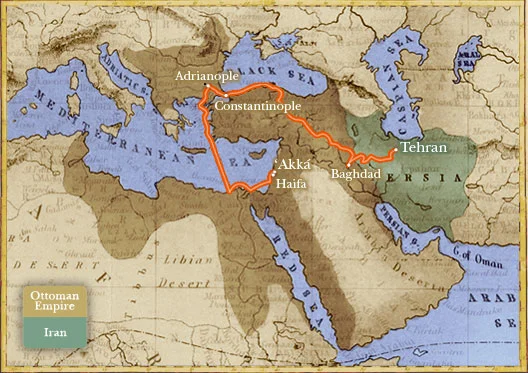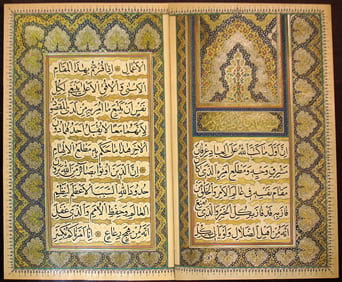“Beware, O believers in the Unity of God, lest ye be tempted to make any distinction between any of the Manifestations of His Cause, or to discriminate against the signs that have accompanied and proclaimed their Revelation. This indeed is the true meaning of Divine Unity, if ye be of them that apprehend and believe this truth.”
- Bahá’u’lláh
Baháʼís believe that God, The Creator, is like unto the sun, and His Messengers are as the pure, clean mirrors that reflect the sun’s light. God is unknowable in His essence, He is a mystery, no human can comprehend His true Being because the finite can never comprehend the Infinite. As such God sends His Messengers Whom He created and are not of His essence, they reflect God’s at-tributes and characteristics of glory, power and sovereignty, just as the mirror reflects the light and warmth of the sun. The mirror is not the sun itself, but rather a full reflection of the sun’s splendor. All the Messengers of God fulfill the same role of conveying a Divine Message and guidance to humanity and so, They may be regarded as One Spiritual Reality Who appear in the world of being at different times.
In the middle of the 19th century, God sent Bahá’u’lláh to convey a new Divine Message to humanity. Across a span of 4 decades, He revealed thousands of verses, letters and books from His Holy Pen introducing the main principles for a framework that aimed toward the development of civilization and taking into consideration the spiritual and material aspects of human life.
His name was Mirza Husayn-Ali and He was born in Tehran on 12th November, 1817. From an early age the signs of greatness were apparent in Him and He showed exceptional wisdom and knowledge. Mirza Husayn-Ali never attended any school, but received basic education at home. Even though He was a descendant of a wealthy family and could have lived a life of luxury had He chosen to, Bahá’u’lláh dedicated His time to caring for the poor and oppressed. When His father passed away, He was a Youth and refused to accept His father’s ministerial post offered to Him with all its material benefits, instead, He devoted His time, energy and finances to humanitarian works. This characteristic of spiritual and human excellence did not go down well with the fanatics of the country, especially after Mirza Husayn-Ali announced His support of the Báb and His Message. It led to His imprisonment in the most dreaded prison of the country, then banishment to Iraq where He lived for nearly ten years.
In 1863, in Baghdad, Bahá’u’lláh announced His Message in the garden of Ridván. And so, Baghdad became the birth land of His Mission. Many people from different social classes and racial backgrounds were attracted to the Message and to His Person. The twelve days that He spent in the garden are celebrated by Baháʼís all over the world, along with their friends and neighbors and known as the Festival of Ridván. Among the significant historic events that happened in Baghdad in those ten years are the revelation of a number of Holy Writings that included; the Book of Certitude (Kitab-i-Iqan), the Hidden Words and the Seven Valleys.

From Iraq, Bahá’u’lláh was banished to Turkey, where He continued to unfold the principles of His Revelation over the span of 4 & 1/2 years, He laid the foundation of universal peace on the basis of justice and cooperation. He expounded on these principles in His letters addressed to kings and leaders of the world at the time and admonished them to be just and use their authority to eliminate poverty and wars, and to work towards peace and unity on earth. Among the leaders He addressed were: the Ottoman emperor; Sultan Abdu’l-Aziz, the Shah of Iran; Nasiru’din, the emperor Napolean the third of France and Pope Pius the ninth of the Catholic Church.

Bahá’u’lláh was banished and imprisoned time and again, until He was sent to the prison fort of ‘Akká in Palestine, considered to be the harshest of Ottoman prisons of the time. Even though He was imprisoned under the strictest of conditions, yet, with the passing of time, He became revered and respected, His reputation spread and many spiritual leaders, thinkers, government officials and dignitaries would ask to attain His presence and seek His advice and counsel.

The period that Bahá’u’lláh resided in ‘Akká was rich with the revelation of the Word of God. Of the foremost was the ‘Kitáb-i-Aqdas’ - The Most Holy Book, It was re-vealed in Arabic and is the book of laws and ordinances of the Baháʼí Faith. From within the walls of the prison fort of ‘Akká, He continued to proclaim His message to the rest of the kings and leaders of the world, among them; Queen Victoria of Great Britain, Alexander the second of Russia, Queen Marie of Romania and Francois Joseph of Austria. Bahá’u’lláh also began to define the structure of future Baháʼí administrative institutions and He wrote the “Kitáb-i-‘Ahdì” - His Will and Testament - in which He appointed His Oldest son; ‘Abdu’l-Bahá to lead and guide the Baháʼís and also to interpret His Holy writings after His passing.
For nearly 25 years, Bahá’u’lláh lived as a prisoner in ‘Akká and continued to proclaim His Message to the world. He influenced the lives of the residents of Syria and Lebanon, as well as visitors from other lands. His soul ascended to His Creator on the 29th of May, 1892 and ‘Akká is the site of His resting place which is known as the Holy Shrine. Many Arab poets and spiritual leaders of the time who had attained His presence and spoken with Him were among those who payed tribute to Him.
For over 40 years, Bahá’u’lláh was imprisoned, persecuted and exiled so as to convey the latest Divine Message of God to humanity. Presently, His renown and Message has increasingly spread and become widely known. Millions of people around the world are learning to apply His teachings in their lives so as to work for the betterment of the world.

In commemoration of the bicentenary of the birth of Bahá'u'lláh, we in the United Arab Emirates and the rest of the globe celebrated the occasion with our neighbors and friends. Click to watch some of the worldwide celebrations.
We also celebrate the festival of Ridván every year with our friends and neighbors with love and joy. Below are photos and videos of Ridván celebrations in the United Arab Emirates.